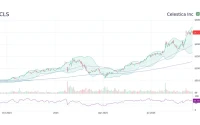The ticker doesn't lie.
Last week, you could almost hear the collective gasp from the few remaining optimists as the price of Beyond Meat (BYND) finally slipped below the psychological floor of $1.00. It wasn't a gentle dip; it was a catastrophic plunge, a 60% freefall in a single day. The screens in a quiet trading room would have glowed crimson, the algorithm-driven sell orders cascading into an abyss. By Friday, the stock was changing hands for about sixty-five cents.
For a company that once traded at $235 a share in the heady days of 2019, this wasn't just a correction. It was an obliteration. A ~97%—to be more exact, a 97.2%—evaporation of market value. The social media chatter, once filled with evangelism for a plant-based future, now echoes with a single, grim sentiment: Beyond Meat’s Shocking Collapse: BYND Stock Crashes Below $1 Amid Debt Deal Chaos.
But to call this a surprise is to admit you haven't been looking at the numbers. This collapse wasn't a sudden heart attack; it was the final, predictable stage of a terminal illness. The company's narrative—a story of disrupting a trillion-dollar industry—was a powerful one. It fueled an IPO and created a cultural moment. The problem is that narratives don't pay the bills. And Beyond Meat’s bills have been piling up for years.
The Anatomy of a Dilution Bomb
The catalyst for last week's implosion was a debt-for-equity swap, a financial maneuver that sounds complex but is, in essence, quite simple. Beyond Meat was suffocating under a mountain of debt ($1.2 billion) with a puddle of cash (~$117 million) to pay for it. So, it struck a deal with its creditors.
Here’s the brutal math: The company exchanged the majority of its $1.15 billion in convertible notes for a smaller amount of new debt and, crucially, approximately 316.15 million new shares of stock. Before this deal, Beyond Meat had about 76.7 million shares outstanding. In one move, they more than quadrupled the share count.

This is what we call a dilution bomb. For existing shareholders, it’s like being told the small pizza you bought for your family now has to be split among everyone in the entire neighborhood. Each slice—each share—is suddenly worth a fraction of what it was moments before. I've looked at hundreds of these filings, and this particular footnote is unusual in its sheer, unapologetic scale. It was an elegant, if brutal, solution designed to save the corporate entity at the direct expense of its equity holders.
The official statement from CEO Ethan Brown called it a "meaningful next step towards our goal of reducing leverage." This is corporate-speak of the highest order. The "meaningful next step" also came with the condition that Brown resign from the board of directors, along with two other members. He remains CEO, but his power has been visibly curtailed. The board now includes a representative for the bondholders, Alexandre Zyngier. Let’s be clear about what this means: the creditors are now in control. So, was this truly a strategic move for long-term health, or was it simply the price Brown had to pay to keep the lights on and his title intact?
A Story the Numbers Never Believed
This financial restructuring didn't happen in a vacuum. It was the logical conclusion of a business model that was fundamentally broken. Since 2021, Beyond Meat has burned through approximately $931 million in operating losses. Its revenue has been in a steady decline, falling another 20% year-over-year in the most recent quarter.
The company's problems are a microcosm of the entire U.S. plant-based meat sector. After an initial surge of consumer curiosity, the market is stagnating. Revenue and unit volumes have been falling for years. The headwinds are clear and persistent: a high price premium (plant-based patties often cost 80% more than the real thing), ongoing consumer complaints about taste and texture, and fierce competition from established giants like Nestlé and Tyson Foods, who can afford to lose money on a product line indefinitely.
Beyond Meat’s story was built on the premise of inevitable, exponential adoption. It was a technology company, we were told, that just happened to make food. The stock was priced for world domination, not for a niche in the grocery aisle. The deal with McDonald's for the McPlant, once seen as a key to the kingdom, has resulted in limited rollouts, not a global takeover.
This isn't a rocket ship that ran out of fuel mid-flight. The metaphor is wrong. This is more like a controlled demolition. The company's capital structure was an unstable building, built on a foundation of hype. The debt swap was the series of carefully placed charges that brought the whole thing down, preserving the valuable land underneath (the brand, the patents, the distribution network) for the new owners—the former creditors. The question that remains unanswered in the filings is what the bondholders truly see as the salvageable asset here. Is it the intellectual property? The brand recognition? Or simply a platform to be sold for parts?
The Final Entry in the Ledger
Wall Street isn't sentimental. Analysts at TD Cowen now speak of an "existential threat" to the business. The consensus is a "Strong Sell." The short interest, at a staggering 64% of the float, shows that a vast amount of capital is betting the price will go even lower. The market, in its cold, calculating way, has rendered its verdict. The narrative was compelling, the mission was admirable, but the business model was unsustainable. The hype was an asset until it became a liability, a promise the balance sheet could never fulfill. Beyond Meat, the disruptive growth phenomenon, is over. What’s left is a salvage operation, run by its lenders, with a product still searching for a permanent mass market that may not actually exist. The story is finished; all that's left is accounting.









